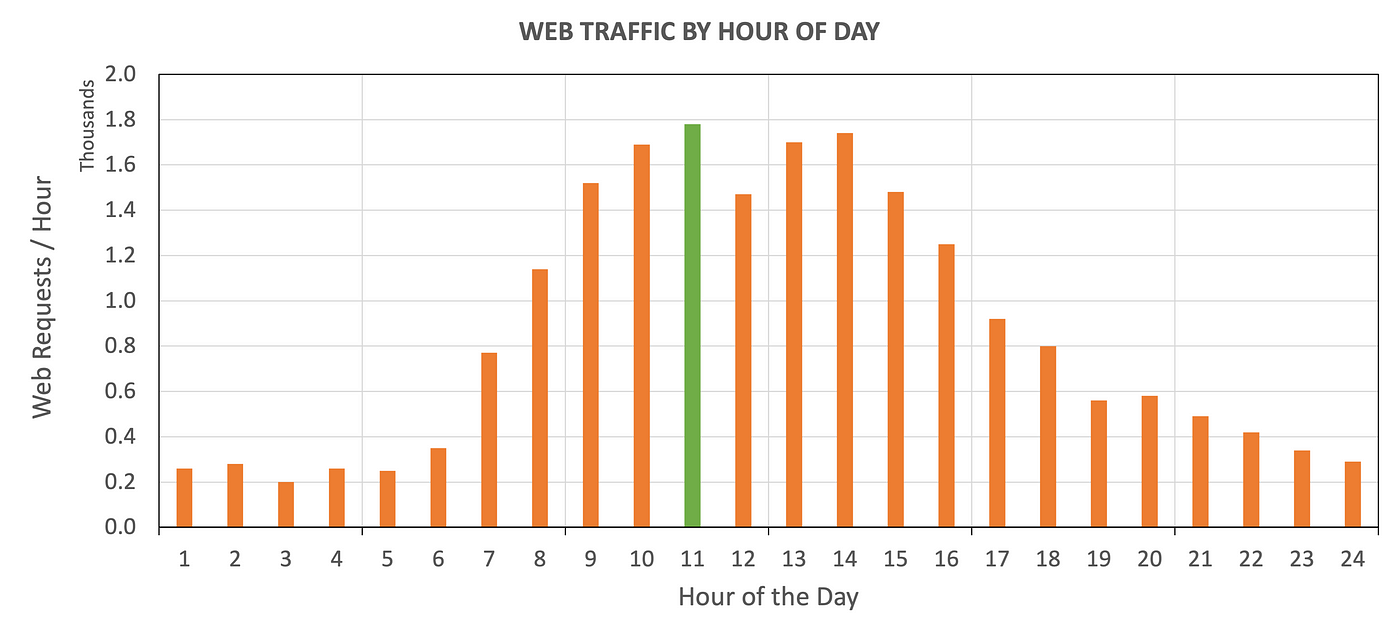
Regardless of the hosting system, when site traffic increases, loading time problems can occur. Getting as much website traffic and visitors as possible is every website owner’s dream.
You may be excited knowing that you have website traffic because traffic brings you visitors and potential customers, but it can also be a bad thing if your website can’t cope and doesn’t work. Downtime is just as bad as poor design or a slow website.
First, you need to learn to predict these sharp increases in website traffic. They can be good indicators of performance, but the impact that increased traffic can have if you’re not prepared can be costly to your online business.
The month-to-month numbers provide an understanding of the basic traffic profile: low, moderate or high. These numbers also provide insight into potential trends, patterns and seasonality, as monthly traffic can change based on many variables, including marketing campaigns, search engine rankings and market conditions.
If your site is not prepared to handle an increase in popularity, a short-term increase in traffic could cause long-term damage to your search engine optimization (SEO) as well. High traffic can also have an immediate impact on user experience, if your website can’t handle all the traffic, it can slow down to a crawl or worse, crash.
If your store gets so busy that “browsers” outnumber paying customers, you may run into problems. If this happens, your paying customers may leave and go to your competitors. People visiting your site for the first time may conclude that your site is slow and problematic.
A high volume of traffic is an unexpected increase that is significantly higher than the original amount and deviates from the expected trend. Basically, if you get more hits than you expect, this is a high volume of traffic for your particular site. This type of heavy traffic increases the burden on your site’s servers. Instead of capitalizing on the increased traffic, you are now getting fewer conversions than you would expect on a typical day. A dramatic increase in traffic can even exceed your allocated bandwidth. Depending on your hosting plan, this can lead to additional costs. You may need to upgrade your hosting plan to cope with the increased demand.
So what should you do to avoid these situations?
1.When choosing your web hosting plan, you should pay attention to whether the web server can handle web traffic. Even if you choose to start with a shared solution, you should be aware that all resources, including memory and processing speed are shared on that server. And if one of the sites gets a lot of site traffic then the other sites will be affected as resources will be stretched.
To ensure that your site can handle the traffic you will need to choose a middle ground solution namely a VPS which is similar to a dedicated server and the difference between a shared server is that a VPS is shared in such a way that each site has a portion of resources allocated to it exclusively. If one website on the server receives an increase in traffic then the other sites will not be affected and will not experience traffic slowdowns.
2.If you still happen to run into problems, the solution is to optimize your site – limiting the use of themes and templates that contain images and videos can be a good practice to avoid slowing down your site significantly. The larger the file size, the longer they will take to render on a page. A lean website will load faster, even during periods of heavy traffic.
The huge community of themes and plugins is one of WordPress’ greatest strengths. However, poorly designed and maintained themes and plugins can fill your website with unnecessary code. This can degrade the performance of your website and make it more difficult to handle high volumes of traffic.
3.Install a caching plugin. Caching is an important aspect of improving site speed, although it is one of the most overlooked. In short, caching creates static HTML versions of your website content. This reduces the number of times WordPress has to request content, which can help your site handle heavy traffic.
Plugins like W3 Cache will ease the pressure that traffic puts on your service, ensuring that content is rendered in their browsers as quickly as possible. Some plugins allow you to minimize and compress the HTML, JavaScript and CSS files on your WordPress site. Tools like SEO Site Checkup can help you determine if caching is enabled on your site.
4.Conduct regular content checks. Even with the best efforts, exceptional traffic volumes can lead to increased load times in some scenarios. Once your site loads, you’ll want to provide visitors with a seamless experience to combat any negative impressions they have of your website. To ensure you’re providing the best possible experience, it’s a smart idea to conduct regular content audits. By examining the content of your website, you can often identify smaller issues that can impact your visitors’ experience, including broken links.
While performing your content audit, you can also look for opportunities to make your content more engaging. A slow website will always work against you, but quality content can contribute positively to key metrics such as bounce rate and time spent on your site.
Smaller companies usually have tighter budgets, which means their main motivation is to find an affordable plan. We know that shared hosting is a popular choice for many startups and small companies and if the traffic volume is constant, then it will meet the needs of the site and with these plans sharing server resources. However, if your site is experiencing an increase in traffic, you may struggle to access the resources you need to cope with this increased demand.
It doesn’t matter how many visitors or loyal customers you have. It only takes a period of downtime to ruin the trust they had in your business. So what’s the best strategy to keep people on your website? Your hosting provider plays a significant role in helping you manage high volumes of traffic. For best results, we recommend a flexible hosting provider that offers a range of plans and gives you the option to upgrade temporarily during periods of heavy traffic.
